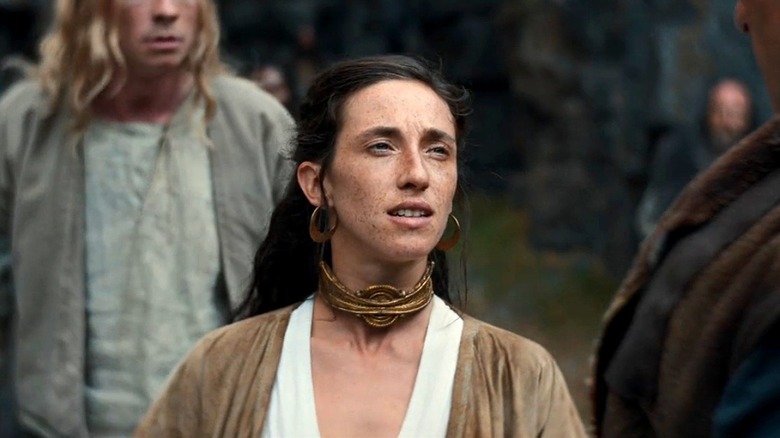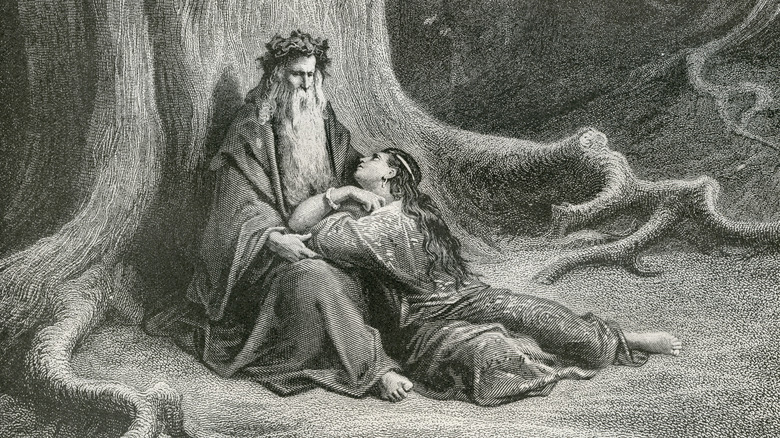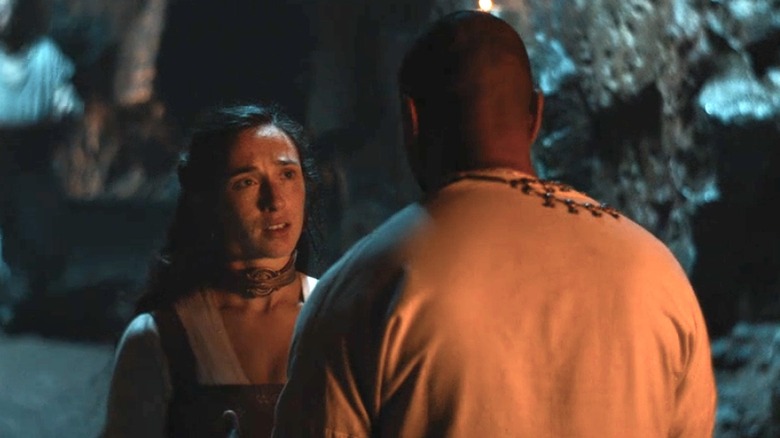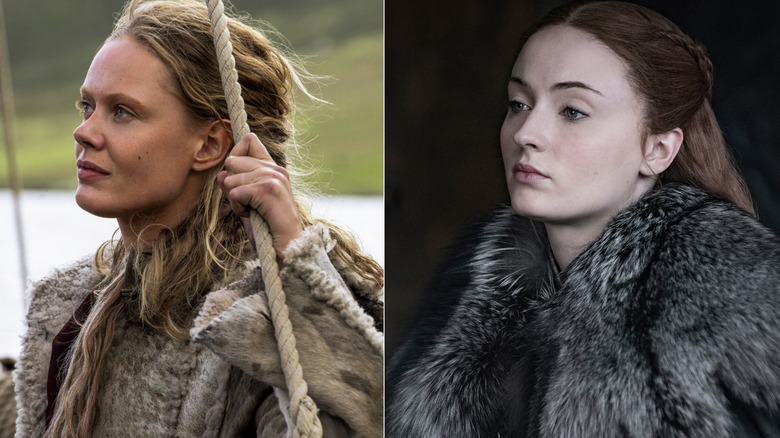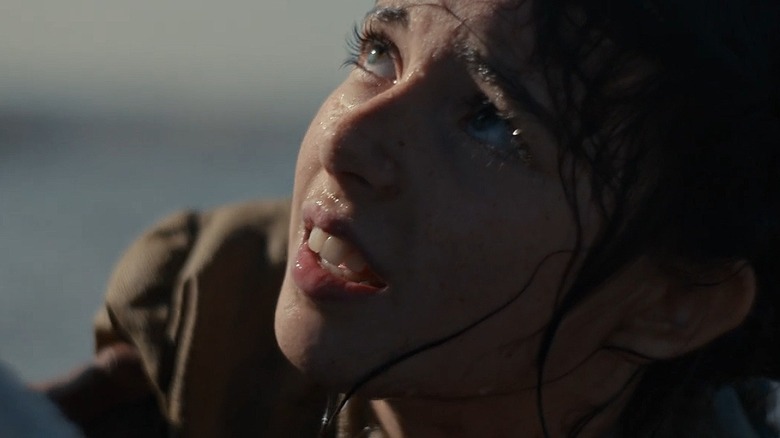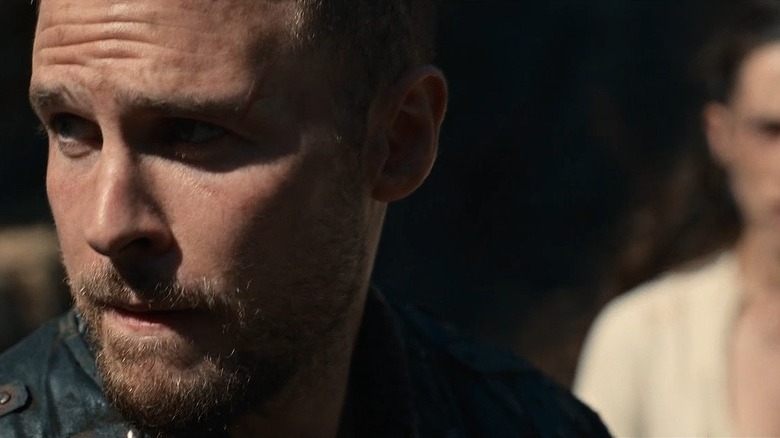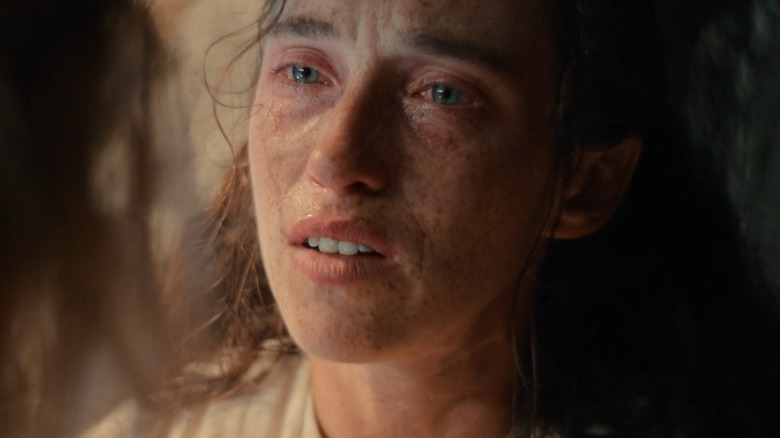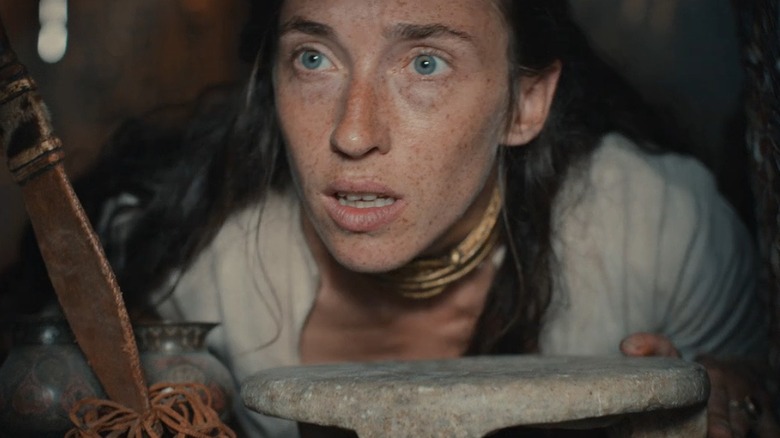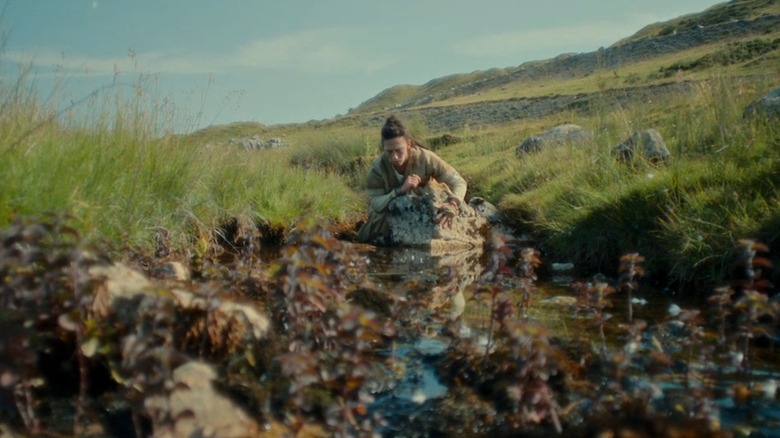The Winter King Repeats Game Of Thrones & Fantasy TV's Biggest Blunder
The following article includes mentions of sexual assault and suicide.
It's difficult to adapt any narrative taken from three 300+ page novels. When that narrative is based on over 1,500 years of evolving historical theories, archeological finds, and literary tradition — as is the case with Bernard Cornwell's "The Warlord Chronicles" — the task is even more complicated.
Clearly, if an artist hopes to make a standout contribution to Arthurian tradition, they'd better create something informed, entertaining, relevant, and unique. This is precisely what Cornwell did when he placed his Arthur in a heavily-researched and expertly rendered version of 5th century Celtic Britain — the setting in which the real Arthur would have existed, if he existed — while managing to imbue his very old world with relevant, contemporary themes.
In adapting "The Winter King," the first novel in Cornwell's trilogy, MGM+ took — and is beginning to squander — an enormous opportunity. Not since the absolute mess of 2004's "King Arthur" has mainstream Hollywood attempted to get Arthur's historical context right. Unfortunately, the series' attempt to toe the line between general Arthurian lit assumptions and Cornwell's hyper-specific spin results in a tired, and harmful, simplification of Nimue (Ellie James). It's a path several "strong female characters" in fantasy television have been forced to take, and it goes like this: a one-dimensional woman suffers trauma at the hands of a man, and said trauma magically transforms her into a full, complex character.
Importantly, Nimue does survive an assault in Cornwell's novel, as well. But in art (as in life), it's not what you say, but how you say it. Thus far, MGM+'s "The Winter King" has not only reduced Nimue to a trope, but fumbled the book's far more complex treatment of her, and revoked most of her agency in the process.
Who is The Winter King's Nimue?
Arthurian tradition is littered with Ladies of the Lake, so to understand why Cornwell's depiction of Nimue is so vital to his contribution's relevance and worth, we must first understand what she's represented in the past. In "Women at the Round Table: Female Characters in Arthurian Literature," Theresa Adams notes that in Sir Thomas Malory's "Le Morte d'Arthur" — the 15th century source for much of what we think of as Arthur's story — "[Women's role] in the book is not to indicate human characters, but rather to mark the good or the evil. They never act for themselves and out of their inner impulses" (p. 33). Malory's "Chief Lady of the Lake," Nymue, is thus notable for her ambiguity, but Cornwell takes things a step further. He not only humanizes her, but raises her to the level of Arthur's foil, all without making her a villain.
Eventually, Cornwell's Nimue does end up at odds with Arthur and Merlin, but her cause is fleshed out: everything Cornwell's Nimue does is rooted in her belief that if she's unable to bring the old gods back to Britain, the land is doomed. She fails, of course, but so does Arthur. If he'd succeeded, you'd be reading this in some modern variation of a Proto-Brittonic language — not English.
So perhaps, Cornwell's subtext suggests, Nimue is right, and Arthur's faith in humans is foolish. Cornwell isn't attempting to answer the question. He's simply creating a character who wants the same result as Arthur, but so fully believes in a completely different means of achieving it that she's willing to make herself the enemy of all who oppose her. She can be ruthless and Machiavellian, but so can Arthur.
Sadly, this is not the Nimue of MGM+'s adaptation.
The Winter King gives Nimue's agency to Merlin
In "The Winter King," Cornwell's narrator Derfel (Stuart Campbell in the show) describes Nimue as the cleverest person he knew, but also a deeply sad one — because of her knowledge. From the start, we understand Nimue's potential for darkness and disillusion as an inherent trait. It's not the result of Merlin's direction, nor of her traumatic assault by Gundleus (Simon Merrells, in the series). Regrettably, the series turns this on its head, by having Merlin (Nathaniel Martello-White) tell her: "Your gift is sacred to the gods," and insisting that her life must be isolated if she hopes to keep her abilities.
Sigh. Where to begin.
Let's start with asking why, in a story wherein the distinction between Celtic paganism and Christianity is so thematically important, the writers would inject a Christian notion of purity into their Celtic pagans' belief system. Did they think viewers would be confused by a strong female character who's both sexually liberated, and devoted so entirely to her gods that she won't let romantic love distract her? In the novels, she's Merlin's lover for a time, and Derfel's, but her soul belongs to the gods alone. It isn't intercourse she sacrifices, but something far harder to resist: contentment. Why turn that difficult choice into a command from Merlin? Every decision Cornwell's Nimue makes is her own.
As for the cliche virginity angle, it appears that rather than trust their source material, the writers simply googled "Druid," cherrypicked their info, threw in some Christian ethics, and called it a day. Again, why? The only logical explanation might be connected to their unnecessary decision to visually depict a sexual assault not shown in the books.
The Winter King makes the Game of Thrones (and Vikings) mistake all over again
In the novels, Derfel doesn't witness Nimue's assault, much less become an emotional focus of it as he does in the series — and in much the same way Theon (Alfie Allen) is the primary character during Sansa's (Sophie Turner) assault in "Game of Thrones."
In the books, when Derfel finds Nimue afterward, he sees that she's lost an eye. Contextually, it's an obvious reference to the pancultural device of a god or seer sacrificing literal vision in order to gain wisdom and foresight (see: Norse mythology's Odin). Perhaps the writers decided losing her eye was too gruesome (but showing the assault was not, apparently), and wanted to have her "lose her sight" in a more conceptual way. Contextually, of course, this makes absolutely no sense, but we'll get to that.
Maybe substituting virginity for an eye seemed like a great way to avoid being accused of unnecessary brutality. Unfortunately, its ultimate effect is to confuse and dilute Nimue's authority, agency, and belief system — all of which are incredibly important to who she is — while suggesting that a woman can't be both a willing sexual creature and a powerful one. She has to choose, and even when she does, she's punished into losing her power by unwillingly losing her virginity. If the goal was to avoid added brutality, why have her lose anything? Is being sexually assaulted not "bad enough" on its own unless the character is a virgin? Incidentally, the virgin-to-victim-to-full character journey is also taken by Emilia Clarke's Daenerys Targaryen, and by Frida Gustavsson's Freydis in "Vikings: Valhalla." In all these instances, a woman must suffer sexual assault in order to fully enter the story or evolve, and that suffering directs her entire character arc.
The Winter King shortcuts Nimue's character development in harmful ways
It's important to look at Nimue's response to her trauma in the novels vs. the series, as well as what we know or don't know about her before and after. The TV Nimue attempts to die by suicide by throwing herself into the river — an action completely out of step with the novel character, who believes herself a child of fate saved from drowning by the goddess Don. Unfortunately, the series relays almost nothing about her personal worldview before Gundleus' attack, and since we don't know what drives her prior to that, we're left only with the sexual assault itself to act as her motivating factor.
By contrast, Cornwell's Nimue explains to Derfel, before her sexual assault, that to speak to the gods she must first suffer the "Three Wounds." Following her assault, in an effort to control her narrative, she decides her suffering was a necessary step on her path to the gods, as we see in this heartbreaking exchange with Derfel:
'I've suffered two Wounds of Wisdom, Derfel,' she said in a voice of crazed wonderment. 'The Wound to the Body and the Wound to the Pride. Now all I face is madness and then I shall be as wise as Merlin.'"
Nimue was already steadfast in her faith, but if the gods fail her now, the story she needs to tell herself about what happened to her will lose all meaning. None of this means she doesn't want revenge, and the suggestion is absolutely not that Gundleus did her some kind of favor. But in having Nimue respond to her trauma in a way that makes sense for the well-developed character who existed prior to it, Cornwell gives us a human, not a trope or device.
If you or someone you know is having suicidal thoughts, please call the National Suicide Prevention Lifeline at 1-800-273-TALK (8255) or text HOME to the Crisis Text Line at 741741.
The Winter King creates a false moral hierarchy
In giving Nimue no self-determined inner impulse other than revenge, the series not only reduces the character, but misses her thematic function. Nimue is neither a protagonist nor an antagonist, but representative of the power of fanaticism, nostalgia, and blind faith. Her quest for the ancient treasures of Briton and her determination to "restore" the country to its pre-Roman glory parallels Arthur's equally zealous determination to obtain peace and unity at all costs — even if it means protecting a sociopath, betraying oaths, or sacrificing allies to the Saxons. This dynamic and its resulting subtext are completely undermined by the series' depiction of Nimue's response to Arthur (Iain De Caestecker) in Episode 3.
In the novels, Nimue doesn't turn on Arthur simply because he won't initially let her kill Gundleus. Nimue sees Arthur as Merlin's sword, and Derfel as her sword, and in her preparation for the coming war with the invaders and their new god, these swords are incredibly valuable to her. It's Cornwell's way of incorporating medieval notions of knighthood into his ancient Celtic world. In the chivalric tradition, knights exist above all to preserve the faith. This is how his Nimue views Arthur with regard to her pagan gods, even when she's upset by his saving Gundleus.
It's only later, when Nimue determines he's not protecting her faith, that she turns on him. Having "revenge" distinguish Nimue from Arthur — and having Arthur give a trite little aside about hate being an emotion that "weakens" — makes the series' Arthur appear morally superior. But the novels, which posit Nimue and Arthur as characters who simply believe in different means of achieving the same end, suggest no such hierarchy.
The Winter King's Nimue exists (reductively) to showcase the series' men
To reiterate — the series didn't invent Nimue's assault. However, from both a characterization and thematic standpoint, it allows it to define her arc in a way the source material does not. TV Nimue begins as a druid's apprentice, there to show us more about Derfel and Merlin than herself, and is then reluctantly convinced by Merlin to devote herself to the gods (even this isn't allowed to be her idea). From there, she's assaulted and seeks revenge. Everything that follows is a result not of Nimue, but of the actions of three men: Merlin, Gundleus, and Arthur.
In the novels, Derfel describes Nimue's defining, overarching motivation — which never once wavers — as "A dream she shared with Merlin, but one that she would never compromise as Merlin would. Nimue was for all or she was for nothing. She would rather have seen the whole earth die in the cold of a Godless void than yield one inch to those who would dilute her image of a perfect Britain devoted to its own British Gods."
Ironic, considering how thoroughly the series dilutes just that. This ethos doesn't change as a result of her assault. Yes, she's enraged. Yes, she's forever impacted by it, and it's an important piece of her development and story. And yes, she wants her great revenge on Gundleus. But he is not her raison d'être, and he does not determine her relationship with Arthur. Always, the larger focus is on saving Britain.
The series gives us none of this, and the greater impact of this over-reliance on strong women being defined (even created) by a sexual assault arc is worth considering beyond the confines of MGM+'s "The Winter King."
The Winter King's issue is bigger than mere shoddy adaptation
Whatever the intent, the result and implications of this choice are damning. For starters, the "sexual assault" arc for female characters in historical/fantasy fiction is played as a rite of passage. Whereas the traditional hero's journey kicks off with A Call to Adventure (which the hero must choose to answer, thereby making him "heroic"), the Strong Female Character's journey kicks off with a trauma that she has no choice but to suffer and respond to. Additionally, every aspect of her personality — from her anger, to her worldview, to her relationships with others — is defined by the man who assaulted her. It's oppression masquerading as agency. It also suggests that the only way for a victim to become a survivor or "take control" is, paradoxically, to let someone else's actions control their narrative. Either you stay angry and exact revenge, or you're lost: the old Shameful Victim/Angry Survivor "choice."
The fact that Bernard Cornwell did not let Nimue's assault function this way makes the series even more disappointing. But this isn't just lazy writing that makes for a bad adaptation, and it isn't just about Nimue, or Sansa, or Daenerys, or Freydis.
We love to delude ourselves into thinking that, as a species, we've really come a long way in terms of how we treat one another — and, in particular, in terms of how those with power treat those without. Perhaps this is why historical fiction and fantasy — with the exception of medieval drama "The Last Kingdom," another Cornwell adaptation — rely so heavily on depictions of sexual assault. But even if these arcs are about seeing a villain get what's coming to them, or patting ourselves on the back for all our "progress," they're certainly not about the survivor character.
The Winter King's sins are tragic on a bigger level
Contemporary society repeatedly re-traumatizes survivors of sexual assault (per NIH). They're mistrusted and doubted by law enforcement (and, in high profile cases, the public at large). They're stigmatized as bitter and damaged, and loved ones can project their own feelings of fear and shame on the individual (per Psychology Today). In film and television, survivors are depicted either as either helpless or as vengeful "badasses" who are nonetheless angry, irrational, cold, and volatile — characterized and driven not by the power they possess, but by the power they've had taken.
Again, whatever the intent, the message is the same. Quietly sink, and you regain or preserve your innocence, but will ultimately drown; fight to stay afloat or swim, and you'll survive, little witch, but be consumed by fire in the end. Either way, you're doomed.
This isn't fantasy as a commentary on or even a reflection of history. This is fantasy as a reinforcement — and harmful perpetuation — of a grotesque, current reality. In other words: the very antithesis of the genre. Ultimately, the real tragedy of MGM+'s "The Winter King" isn't the inevitable failure of its romantic hero, but the fact that 21st century television can't imagine a world wherein women are defined more by what they believe and what they do than by what's done to them. And if we're still failing, in 2023, to imagine that world on a consistent basis, then the notion that we're somehow dramatically smarter, less cruel, and more civilized than our ancestors might very well be the biggest fantasy of all.
All of which, at the very least, proves Cornwell's Nimue right.
If you or anyone you know has been a victim of sexual assault, help is available. Visit the Rape, Abuse & Incest National Network website or contact RAINN's National Helpline at 1-800-656-HOPE (4673).
